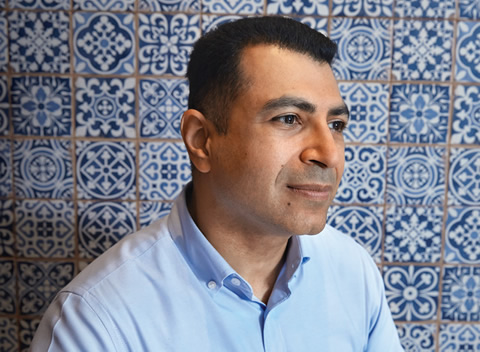To demonstrate how the repetition of biased or selective information can sway popular opinion, Shafique Virani, a U of T professor of Islamic Studies, conducted an experiment with a TEDx Talk audience at UTSC last year. He described a substance called DHM that’s “colourless, odourless and tasteless,” which, in its solid form, “can severely damage human tissue” and “has been found in excised tumours of terminal cancer patients.” Accidental inhalation of DHM, he added, is the third-leading cause of unintentional death worldwide.
“Based on this information,” he asked the crowd, “how many of you would allow DHM to be freely available?” The answer: almost no one. Virani then revealed that the mysterious substance is actually “di-hydrogen monoxide,” otherwise known as water.
During the talk, which is now available on YouTube, Virani draws a parallel between DHM and media portrayals of the Muslim community to help explain where Islamophobia comes from. He notes that in a review of almost one million news stories in the U.S. and Europe about Muslims, a media monitor found that 98 per cent of the items were about radical militants. “When all the information we have is about an infinitesimally small portion of the world’s Muslims, we completely misunderstand ordinary Muslims,” says Virani. “It’s like taking the Ku Klux Klan and saying they are representative of all of Christianity.”
Virani, who is also the founding director of the Centre for South Asian Civilizations based at U of T Mississauga, believes countering Islamophobia must begin with how children are educated. “Children are not born with any sort of bias. You’ll see them playing with people of another gender, of other colours or religions without any regard.”
He would like to see more discussion of culture and religion in schools. “If you think about the words that people are familiar with that relate to Islamic culture, simplistic understandings of ‘sharia’ and ‘jihad’ spring to mind. How many people go to Starbucks but are unaware that the word ‘coffee’ comes from Arabic or have been to the doctor but didn’t know that Ibn Sina’s encyclopedia The Canon of Medicine laid the foundations for modern medical practice in Europe? When people learn about other cultures and religions, they become more broad-minded.”
This philosophy of mutual understanding infuses the Centre for South Asian Civilizations, which was formed in 2012 with donor support. Its mandate involves reaching out beyond the university to the broader public. This is something Virani is also passionate about in his own research in Islamic Studies – a subject that’s not common in North American higher ed. “While Muslims make up close to a quarter of the world’s population, just over 10 per cent of religion and theology departments at Canadian and American colleges and universities have faculty trained in Islamic studies,” he says.
Besides holding public events and talks similar to the one Virani delivered at TEDx, the centre has pioneered the study of important but less commonly taught subjects, with classes in Sikhism, Zoroastrianism, Shiism, Islamic spiritual traditions, Hindi and Urdu. Virani now hopes to promote translations of scholarship by U of T professors into South Asian languages, and to support translations of South Asian literature into English and French.
“We want to make sure that our scholarship is relevant and reaches out to people – that we’re not just in an echo chamber,” he says. “There’s so much more in terms of literature, in terms of science, that could be shared. We’re very focused on having an impact across the world.”







No Responses to “ Overcoming Bias with Teaching ”
This excellent article about Prof. Virani demonstrates the distorting effect of excessive media coverage and space devoted to an extremely small segment of Muslims who defy their own religion to engage in terrorism. His idea of translations of scholarship needs to be implemented to cross barriers.